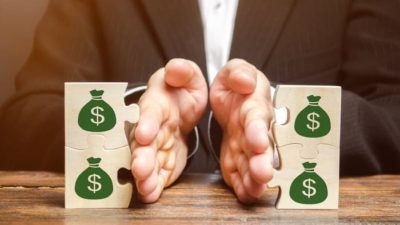This article was originally published on Fool.com. All figures quoted in US dollars unless otherwise stated.
The stock market roared ahead on Tuesday morning, as recent fears from late last week faded completely into the background. As of just before 11.30am EST Tuesday, the Dow Jones Industrial Average (INDEXDJX: .DJI) had soared 587 points to 30,799. The S&P 500 Index (INDEXSP: .INX) had gained 63 points to 3,837, and the Nasdaq Composite (INDEXNASDAQ: .IXIC) climbed 185 points to 13,588.
Many people within the investment community have looked askance at the short squeeze that has hit GameStop (NYSE: GME) and other stocks recently. GameStop shares fell dramatically Tuesday morning, losing 45% of their value. Many expect the stock price to drop still further, undoing the gains that the video game retailer has seen over the past few weeks.
Yet there's something else that happened yesterday that has far larger implications for the stock market. By itself, it's a small thing. But it's only the latest example of how companies are boosting the risk levels in their stocks in order to drive short-term returns – and the move could backfire in the long run.
Apple levers up
The key piece of news came from Apple Inc (NASDAQ: AAPL). The tech giant sold a total of $14 billion in debt, with several different maturities. Here were the final terms:
- $2.5 billion in five-year notes priced to yield about 0.75%.
- $2.5 billion in seven-year notes priced to yield just under 1.25%.
- $2.75 billion in 10-year notes with a yield of 1.65%.
- $1.5 billion in 20-year notes yielding just under 2.40%.
- $3 billion in 30-year notes with a yield of almost 2.70%.
- $1.75 billion in 40-year notes yielding just over 2.80%.
The offering was substantially oversubscribed. Investors flocked to try to grab even these relatively low yields, with more than $33 billion in orders.
This was the third time that Apple had tapped the credit markets in less than a year. A May 2020 bond sale raised $8.5 billion, while the iPhone maker raised another $5.5 billion last August.
What's the problem?
Apple's explanation for the capital raise was consistent with what you'd see from any other company. The tech giant said it expects to use the money for general corporate purposes. Investors expect a big chunk of it to go toward dividend payments and stock repurchases.
But the strange thing about the offering is that Apple has absolutely no need for additional cash. The company reported nearly $77 billion in cash and short-term equivalents as of the end of 2020.
The move continues a long trend for Apple. As recently as 2013, It had less than $17 billion in total outstanding long-term debt. That number had multiplied nearly sixfold to just under $100 billion at the end of last year. This bond offering will take Apple's debt well into 12 figures.
In the early 2010s, there was at least a reasonable explanation for the debt offering. Much of Apple's cash was locked overseas, and there would be huge tax consequences from repatriating it and paying it to shareholders. But the 2018 tax reform efforts ended that concern.
Instead, what's now happening is that Apple is boosting its leverage. By buying shares and increasing debt levels, any future growth will get magnified in terms of per-share earnings performance.
A ticking time bomb?
Many will argue that Apple is just about the safest company in the business world to use this strategy. They'd largely be right. Taking advantage of rock-bottom interest rates to lever up one's business makes perfect sense as long as you believe you can generate better returns with that cash than you're paying in interest.
The problem, though, could come when other companies follow Apple's lead. Not every business has the staying power that Apple has, and if fortunes change, paying down that debt might prove difficult. History has seen countless examples of companies borrowing to buy back stock, only to have to turn right around and sell shares at much lower prices to repay debt during tough times.
Low interest rates are tempting, and companies that can prudently use them to finance growth opportunities are smart to do so. But borrowing just to buy back stock is a step in the wrong direction, and it pushes up the risk levels even for high-quality stocks like Apple. Moreover, the trend could feed rises in stock prices that could increase the chance of a stock market bubble in the near term.
This article was originally published on Fool.com. All figures quoted in US dollars unless otherwise stated.









